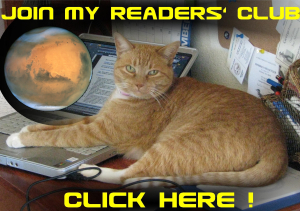Kate Rauner's Blog, page 71
June 29, 2016
Poetry of Science #poem #poetry #science #geek #poems #nature #read #amwriting
After working through several versions with problems like, the page numbers are missing, Rhyme and Reason Three is available now in a digital edition at Amazon and other major on-line book-sellers. The paperback edition is on Amazon and Create Space.
No matter how many notes I take, I learn something new with each book I publish – darn it. So I’ve also updated the formatting for Rhyme and Reason and Rhyme and Reason Two.
Now’s the time to collect all three.
My poetry is inspired by the real, objective world we all share and by Richard Feynman – one of the most important physicists of the 20th Century and certainly the most interesting. He wrote that
Poets say science takes away from the beauty of the stars – mere globs of gas atoms. I too can see the stars on a desert night, and feel them. But do I see less or more? The vastness of the heavens stretches my imagination – stuck on this carousel my little eye can catch one-million-year-old light. A vast pattern – of which I am a part… It does not do harm to the mystery to know a little about it. For far more marvelous is the truth than any artists of the past imagined it. Why do the poets of the present not speak of it? What men are poets who can speak of Jupiter if he were a man, but if he is an immense spinning sphere of methane and ammonia must be silent?”
Spheres of methane and ammonia make me rhyme, and so does earthbound science. Rhyme and Reason Three includes the popular Desert Watermelon. Here’s an excerpt:
Ruby slabs of watermelon
Decorate my table,
While in the wild deserts
Its ancestral stock is stable.
Civilization could collapse,
There could be Armageddon.
But in five thousand years,
Survivors could
-Again –
Have watermelon.
Be the first poetry lover, science lover, or geek to own R&R3.
 Join my Readers’ Club – quarterly update on my writing projects, book offers, and a piece of flash fiction. Click now.
Join my Readers’ Club – quarterly update on my writing projects, book offers, and a piece of flash fiction. Click now.
Filed under: Kate's Books, Poetry Tagged: Amazon, Apple, astronomy, B&N, Barnes and Noble, biology, Create Space, descriptive rhyming poems, environment, epub, humanity, iTunes, kindle, Kobo, learning, mobi, Physics, poem, poetry, poetry collection, poetry inspired by science, rhyme and reason, science, space








June 25, 2016
It’s Huge and Way Past Its Expiration Date
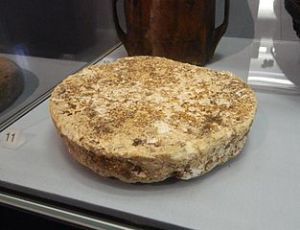
500 year old bog butter – not much to look at
The Irish have been making butter for a very long time, at least 5,000 years. We know, because some of it is still around.
Finding buried treasure is a dream as old as story-telling. Treasure chests overflowing with gold doubloons, shiny lamps containing genies, gargantuan lumps of thousand-year-old butter… with a distinctive, pungent and slightly offensive smell.
Some poor soul buried their store of butter and never returned for it. I bet there’s a story in that.
People who sample bog butter say it tastes more like cheese and modern butter, but after thousands of years I’d expect something to change. Bogs are acidic, cold-water swamps that exclude most oxygen. They occur is various north European countries and butter isn’t the only thing preserved there. Studies have shown burying meat in a bog is as effective as keeping it in a modern freezer. You may be more familiar with mummies found in bogs.
I’d love to spread some bog butter on my morning toast, but I’d want it cultured for pathogens first! I’m a wimp.
Thanks stuff.co.nz 2000-year-old-lump-of-butter
Filed under: Neat Science News Tagged: bog, butter, early agriculture, early animla husbandry, history, Ireland, Irish, peat








June 22, 2016
Solstice Star in the Grass #science #nature #solarsolstice #insect #star
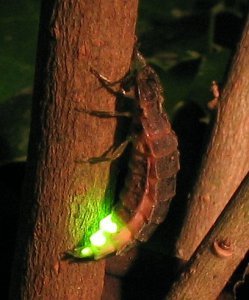
This female glowworm’s light is green. My beetles are pale with a blue-white light
A solstice moon has washed away
Starlight from up high,
Leaving Mars and Jupiter
To dominate the sky.
But here a tiny blue-white star,
A fleck of light below,
Nestled in the parched-dry grass
That gives a steady glow.
Rare the sight in my backyard,
This pale beetle’s essence,
As wonderful as any star
Is bioluminescence.
Pressures vast drive fusion
And spark atomic fires,
While at my feet, luciferin
Lights a bug’s desire.
A star will shine a billion years,
This bug a night or two.
Yet it will breed another life
As sure as stars will do.
Every year I see a scant few glow beetles at my New Mexico mountain home – only for a few nights around the solstice, just before the monsoon rains begin – so few I hate to disturb them. Each one is tiny and pale, and does not seem to move much once it begins to glow. I’ve never seen a flying counterpart, so they’re not like the fireflies I chased as a kid in New York State. If anyone can tell me what critter I’m watching, please post a comment below. Thanks.
Filed under: Poetry Tagged: beetle, bioluminescence, bioluminescent, Firefly, luciferin, nature, solstice, stars, summer evening








June 18, 2016
Ballooning Spiders #nature #Australian #flood #creepy #science
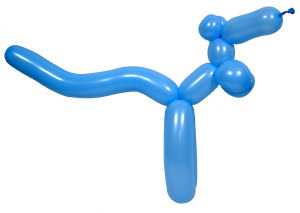
Wrong kind of ballooning!
Record rains have fueled major floods around Launceston, the second-largest city in Tasmania, Australian. I’d expect people to evacuate.
But I didn’t expect spiders to take to the air. In a “mass ballooning event,” millions of small black spiders climbed as high as they could and spun out enough silk to catch the wind and transport them away. Thanks to weather patterns, they tend to land in the same place.
Local resident Ken Puccetti, who photographed the webs, [said] the silk was so dense, that his attempts to photograph it ended with his shoes, legs, and arms covered with silk—and the occasional spider.
“Sheets” and a “tangled mat” of webbing covers trees in flooded Launceston, which may indicate that the spiders were blown back to their starting points many times, to abandon the old webbing and start again, before escaping – since there don’t seem to be many spiders among the silk.
Pretty darn impressive for a bug.
Quick reminder: My new poetry collection will be available in July. Join my Readers’ Club now to receive a  coupon for a free digital copy from Smashwords.
coupon for a free digital copy from Smashwords.
Thanks to nationalgeographic.com for the quotations above. For more, see wikipedia.org.
Filed under: Neat Science News Tagged: citizen scientist, Launceston Tasmania Australia floods, nature, riding the wind, spider








June 15, 2016
Get your free collection of science-inspired poetry Click Now #poem #poetry #science #free #giveaway
My new poetry collection will be available in July. Join my Readers’ Club now to receive a coupon for a free digital copy from Smashwords.
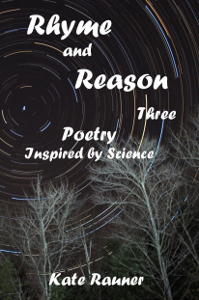 Poetry that favors rhyme;
Poetry that favors rhyme;
Inspired all by science;
Outward to the edge of time;
Or tied to earthly cadence.
Light and written all for fun,
There is no angst to hide.
You’re invited now to sample some
Of my poems inside.
And a few haiku, too.
Over forty poems, most of them revised since they first appeared on my blog, including the popular Desert Watermelon:
…
Ruby slabs of watermelon
Decorate my table,
While in the wild deserts
Its ancestral stock is stable.
Civilization could collapse,
There could be Armageddon.
But in five thousand years,
Survivors could
-Again –
Have watermelon.
I send a Club email about quarterly with news from my writing projects, book offers, and a piece of flash fiction. No spam ever and you can unsubscribe at any time.
Join today and be the first to own my latest collection – for free.
Filed under: Kate's Books, Poetry Tagged: astronomy space, biology environment, collected, collection, evolution learning, inspired by science, nature, poem, poems that are fun, poetry, rhyme, rhyme history physics, rhyming, science nature haiku








June 11, 2016
What Does Mars Smell Like? #space #science #scifi #Mars #solarsystem #Moon
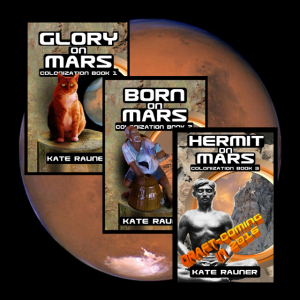 We know what space smells like because people have been there.
We know what space smells like because people have been there.
Clinging to suit, helmet, gloves, and tools of astronauts returning from space walks is a metallic odor, “pleasant sweet smelling welding fumes” says ISS Science Officer Don Pettit. nasa.gov/spacechronicles
We know what the moon smells like, too.
According to Apollo astronauts, moon dust “smells like spent gunpowder,” and tastes “not half bad.” nasa.gov/smellofmoondust
No one has sniffed Martian dust yet, at least not with a human nose.
But future missions “could take a spectroscopic reading of the Martian atmosphere, then beam that information back to Earth” where the molecules could be recreated for anyone to sniff. Expect “sulfur, acids, magnesium, iron and chlorine compounds, all of which are sunbaked and wrapped in a carbon-dioxide-rich atmosphere.” scientificamerican.com/mars-smell-like
In my science fiction stories about the first colony on Mars, I started with the smell of the Moon and added metallic overtones. But it’s acrid, too. I’ve worked in oil refineries and in copper extraction plants – sulfur is a strong part of the smell in both places and not pleasant at all.
I wonder how close I got? Read one of my books and see for yourself. Can’t smell for yourself yet. You’ll have to use your imagination for now.
Filed under: Kate's Books, Neat Science News, Science Fiction Tagged: astronaut, ISS International Space Station, NASA, what does Mars smell like? Colony on Mars, what does moon dust smell like, What does space smell like








June 8, 2016
Center of the Universe #space #physics #cosmology #science #ego #poem #poetry
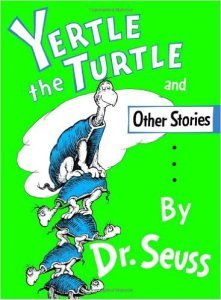
Who’s the center of the Universe?
You’ve heard that space is expanding,
You’ve heard that science is sure
That galaxies fly from galaxies
For as long as time endures.
But if space-time is expanding,
Just what’s it expanding into?
What’s beyond the edge of
The universe that we view?
Just more and more that we’ll never see,
Each frame of reference is valid.
Each star’s at the center of everything
Regardless of how much is added.
So I might be forgiven for saying
That I stand in a special place,
That I am the center of everything,
Of energy, matter, and space.
By Kate Rauner
Thanks to space.com for the question, and for giving me an excuse to believe I’m more important that you are! My poem reminds me of Dr Suess’s Yertle the Turtle
June 4, 2016
Great Premise and Writing Drew Me Into This #Scifi #Book #Alien #FirstContact #ebook
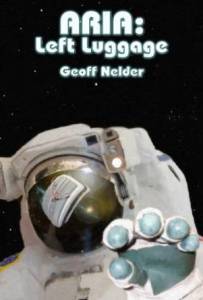 The premise of ARIA: Left Luggage by Geoff Nelder is fascinating. An alien artifact is found in orbit, opened on Earth, and releases an epidemic that erases memories – starting from yesterday and eating rapidly back through your life.
The premise of ARIA: Left Luggage by Geoff Nelder is fascinating. An alien artifact is found in orbit, opened on Earth, and releases an epidemic that erases memories – starting from yesterday and eating rapidly back through your life.
What would I do if I woke up on an airplane with a horrific hangover and no memory of how I got there or where I’m going? What if self-control eroded so everyone was increasingly violent?
Suppose I knew I was infected and realized what was coming? Where would I go? What notes would I leave myself to compensate for my life slipping away?
If I was lucky enough to escape to a doomsday prepper’s hideaway without being infected, would I kill anyone who approached? How would I try to help humanity?
And as the world fell apart, would I wonder who did this? Why? Where are they? And what’s next?
I wrote those questions in first person because this story drew me in – I could identify with the characters – those escaping and those losing their memories, which is a version of losing their minds. Nelder shares characters’ discussions and planning as well as the action with readers.
While the first half of the book shows various groups trying to deal with the disaster, in the second half there are more complications, discoveries, and things go terribly awry for the main characters. Yet there is (perhaps?) a glimmer of hope.
This is the first book in a trilogy
Be prepared for the final pages to set up the next book rather than bring the story to a conclusion. Solving the “big” mysteries of the story has to wait. For those of you who hate to start a series without knowing it will conclude: the second and third books are available now, and (as the description says, so I’m not a spoiler) “we finally meet the aliens.”
What others are saying
Reviewers agree that the book is engaging and makes them wonder how they would react in such a situation. You won’t find many negative comments on Amazon, and even a rare unfavorable review said “looks like it would make a hell of a movie.” The author refers to the International Space Station and Space Shuttle, but in the story these have capabilities beyond the real-life craft – that’s a small complaint about a science fiction story in my mind.
Filed under: Science Fiction Tagged: alien, doomsday prep, first contact, Geoff Nelder, science fiction, SciFi, sf, what if everyone loses their memory








Great Premise and Writing Drew Me Into This #Scifi #Book #Alien #FirstContact
 The premise of ARIA: Left Luggage by Geoff Nelder is fascinating. An alien artifact is found in orbit, opened on Earth, and releases an epidemic that erases memories – starting from yesterday and eating rapidly back through your life.
The premise of ARIA: Left Luggage by Geoff Nelder is fascinating. An alien artifact is found in orbit, opened on Earth, and releases an epidemic that erases memories – starting from yesterday and eating rapidly back through your life.
What would I do if I woke up on an airplane with a horrific hangover and no memory of how I got there or where I’m going? What if self-control eroded so everyone was increasingly violent?
Suppose I knew I was infected and realized what was coming? Where would I go? What notes would I leave myself to compensate for my life slipping away?
If I was lucky enough to escape to a doomsday prepper’s hideaway without being infected, would I kill anyone who approached? How would I try to help humanity?
And as the world fell apart, would I wonder who did this? Why? Where are they? And what’s next?
I wrote those questions in first person because this story drew me in – I could identify with the characters – those escaping and those losing their memories, which is a version of losing their minds. Nelder shares characters’ discussions and planning as well as the action with readers.
While the first half of the book shows various groups trying to deal with the disaster, in the second half there are more complications, discoveries, and things go terribly awry for the main characters. Yet there is (perhaps?) a glimmer of hope.
This is the first book in a trilogy
Be prepared for the final pages to set up the next book rather than bring the story to a conclusion. Solving the “big” mysteries of the story has to wait. For those of you who hate to start a series without knowing it will conclude: the second and third books are available now, and (as the description says, so I’m not a spoiler) “we finally meet the aliens.”
What others are saying
Reviewers agree that the book is engaging and makes them wonder how they would react in such a situation. You won’t find many negative comments on Amazon, and even a rare unfavorable review said “looks like it would make a hell of a movie.” The author refers to the International Space Station and Space Shuttle, but in the story these have capabilities beyond the real-life craft – that’s a small complaint about a science fiction story in my mind.
Filed under: Science Fiction Tagged: alien, doomsday prep, first contact, Geoff Nelder, science fiction, SciFi, sf, what if everyone loses their memory








June 1, 2016
Broken Moons #science #space #poem #poetry
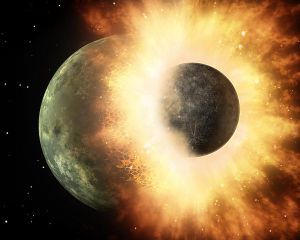
Protoplanets collide, but tidal forces may have been important, too
The solar system was a dangerous place
Three billion years ago.
Protoplanets and icy debris
Hurtled to and fro.
Bent space with their masses,
Warped time as they flew,
Leaving behind
Crusts networked with clues.
It didn’t require direct impact,
While those were common too,
Tidal encounters were all that it took
To rend a surface in two.
Life’s a system so fragile!
We worry if temperatures rise.
We’re shook by quakes and volcanoes,
But at least our crust won’t divide.
I’m glad to be born in the relative calm
Since planets have cleared out their orbits.
Snuggled within a biosphere,
Not hammered by what came before it.
By Kate Rauner
Thanks to space.com and Alice Quillen (University of Rochester in New York) et al for their new modeling study, which has been accepted for publication in the journal Icarus.
Filed under: Poetry Tagged: Biosphere, origin of moons, Origin of the solar system, planetary tidal forces, protoplanets collide









